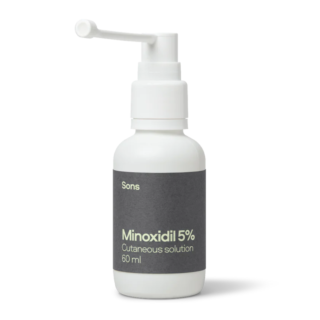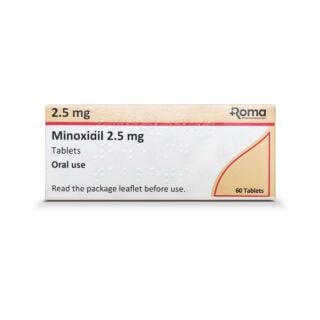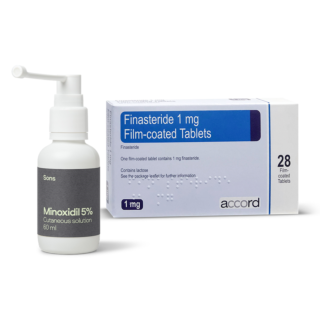Minoxidil Side Effects

Minoxidil is a popular treatment for hair loss. While it’s not fully understood how minoxidil works is effective for hair loss, one benefit is that as a vasodilator, minoxidil expands your blood vessels. This promotes healthy blood flow and helps to deliver more oxygen and nutrients to your hair follicles, resulting in hair growth.
Like all medications, minoxidil can cause some side effects. Generally, minoxidil is very we ll tolerated, meaning very few people experience these, especially if they’re only using a low dose (2% concentration). However, high doses of minoxidil (5% concentration) are associated with causing more side effects.
Below, we take a look at what the side effects are and how they differ between the oral and topical forms of minoxidil for hair loss.
Side effects of minoxidil
The side effects of minoxidil vary depending on whether you use a topical or oral formulation. This is because minoxidil spray side effects are localised to the area the medication is applied to. On the other hand, oral minoxidil dilates blood vessels throughout your body, which increases the risk of systemic (whole body) side effects. Oral minoxidil is only available as an ‘off-label’ treatment, which means that while it can be used for hair loss, it hasn’t been licensed for that use.
Topical minoxidil side effects
The most common side effects of topical minoxidil include:
- redness, itching or a skin rash at the application site
- hypertrichosis (unwanted non-scalp hair growth, such as facial hair)
- increased dandruff
- initial hair shedding
Rarely, you may experience:
- acne at the application site
- a burning scalp
- increased hair loss
- inflammation or soreness at the root of the hair
- a swollen face
Very rarely, too much medicine may be absorbed into the body. This may cause:
- vision changes, such as blurred vision
- chest pain
- dizziness, lightheadedness and fainting
- a fast or irregular heartbeat (heart palpitations)
- flushing
- headaches
- numb or tingling hands, feet, or face
- swollen face, hands, feet, or lower legs
- rapid weight gain
Minoxidil oral side effects
The most common minoxidil tablets side effects include:
- fast or irregular heartbeat (heart palpitations)
- rapid weight gain
- hypertrichosis (unwanted non-scalp hair growth, such as facial hair)
Rarely, you may experience:
- fluid retention
- chest pain
- shortness of breath
- low blood pressure
- skin rashes and itching
- nausea and vomiting
- breast tenderness
- blood test abnormalities
- dizziness and light-headedness
- tachycardia (increased heart rate)
- headaches
- bloating
- flushing
- numb or tingling hands, feet, or face
What are the serious side effects of minoxidil?
While uncommon, topical and oral minoxidil can sometimes cause a severe allergic reaction (anaphylaxis). You should call 999 if:
- you suddenly have a swollen mouth, throat, tongue or lips
- you're struggling to breathe or breathing very fast (it may feel like you're choking or gasping for air)
- your throat feels tight or you're struggling to swallow
- your skin, tongue or lips turn blue, grey or pale (this may be easier to see on the palms of your hands or soles of your feet if you have black or brown skin)
- you suddenly feel confused, drowsy or dizzy
- someone faints and cannot be woken up
- a child is limp, floppy or not responding like they normally do (their head may fall to the side, backwards or forwards, or they may find it difficult to lift their head or focus on your face)
- you have a rash that's swollen, raised, itchy, blistered or peeling
Does minoxidil cause long-term side effects?
Most of the time, the side effects of minoxidil are temporary, lasting no longer than a few months. Often, they subside with continued treatment or disappear altogether if you decide to stop using minoxidil. But how long side effects last depends on whether you’re using topical or oral minoxidil, the dose, treatment frequency, and your genetic predisposition to certain side effects. As a result, there is no guaranteed timeline for when you should stop experiencing them.
Frequently asked questions about minoxidil side effects
Are minoxidil side effects in women different?
The side effects of minoxidil are the same for women as they are for men. As a result, women are normally advised to use a 2% concentration of minoxidil, because the 5% concentration comes with a higher likelihood of unwanted facial hair growth. Women can use the 5% concentration in the foam formulation, but it’s advised you only use it once a day, rather than the twice daily dosage recommended for men.
Can minoxidil have sexual side effects?
Minoxidil is very unlikely to cause sexual side effects, like erectile dysfunction and ejaculation disorders. Sexual side effects are more commonly associated with finasteride, another non-surgical hair loss treatment.
Do you lose hair after stopping minoxidil?
Yes, if you stop using minoxidil, your hair loss will resume within a few weeks, unless you start another treatment, such as finasteride.
Does minoxidil cause weight gain?
There is no evidence that minoxidil causes weight gain. However, at higher doses, minoxidil can cause water retention. This can result in bloating and puffiness due to a temporary shift in the water balance in your body, but this is not the same as real weight gain.
Does minoxidil cause low blood pressure (hypotension)?
Minoxidil was originally designed to treat high blood pressure before it was discovered that promoting healthy blood flow also supports hair growth. Consequently, it may lower your blood pressure while you’re using it. However, this is mainly an issue associated with taking oral minoxidil, which can cause systemic side effects.
Is oral minoxidil safe?
Both oral minoxidil and topical minoxidil have good safety profiles, meaning they are generally well tolerated. However, everyone responds to these treatments differently and you may find the side effects difficult to live with.
Sources
- Minoxidil and its use in hair disorders: a review. 2019. Drug Design, Development and Therapy. Accessed 16 September 2025.
- Compliance to Topical Minoxidil and Reasons for Discontinuation among Patients with Androgenetic Alopecia. 2023. Dermatology Therapy. Accessed 16 September 2025.
- Safety of low-dose oral minoxidil for hair loss: A multicenter study of 1404 patients. 2021. Journal of the American Academy of Dermatology. Accessed 16 September 2025.
- Role of Oral Minoxidil in Patterned Hair Loss. 2022. Indian Dermatology Online Journal. Accessed 16 September 2025.
- A Case of Contact Allergic Dermatitis to Topical Minoxidil. 2021. Cureus. Accessed 16 September 2025.
- Scalp Psoriasiform Contact Dermatitis with Acute Telogen Effluvium due to Topical Minoxidil Treatment. 2016. Skin Appendage Disorders. Accessed 16 September 2025.
- Persisting allergic patch test reaction to minoxidil manifested as cutaneous lymphoid hyperplasia. 2015. Contact Dermatitis. Accessed 16 September 2025. PubMed
- Analysing efficacy of low-dose oral minoxidil, topical minoxidil, and platelet-rich plasma with topical minoxidil combination in patients with androgenetic alopecia: a randomized controlled observer blinded trial. 2025. Arch Dermatol Res. Accessed 16 September 2025.
- Does topical minoxidil at concentrations higher than 5% provide additional clinical benefit?. 2022. Clinical and Experimental Dermatology. Accessed 16 September 2025.
- Anti-invasive effects of minoxidil on human breast cancer cells: combination with ranolazine. 2020. Rep Prog Phys. Accessed 16 September 2025.
- Oral minoxidil for the treatment of late alopecia in cancer survivors. 2023. J Feline Med Surg. Accessed 16 September 2025.
- Differences in reproductive toxicology between alopecia drugs: an analysis on adverse events among female and male cases. 2024. Adv Mater. Accessed 16 September 2025.
- Minoxidil Topical Solution or Foam. Cleveland Clinic. Accessed 16 September 2025.
- Minoxidil Topical Route. Mayo Clinic. Accessed 16 September 2025.
- Topical Minoxidil. NICE. Accessed 16 September 2025.
- Minoxidil. International Society of Hair Restoration Surgery. Accessed 16 September 2025.
- Minoxidil Topical. WebMD. Accessed 16 September 2025.
- Minoxidil for Hair Loss. Gloucestershire Hospitals NHS Trust. Accessed 16 September 2025.
- Minoxidil Oral Route. Mayo Clinic. Accessed 16 September 2025.
- Minoxidil. Medical News Today. Accessed 16 September 2025.
- Does Oral Minoxidil Cause Weight Gain? Here's What You Should Know. Oana Health. Accessed 16 September 2025.
- A randomized, placebo-controlled trial of 5% and 2% topical minoxidil solutions in the treatment of female pattern hair loss. Accessed 16 September 2025.
*Downloading the app nominates us as your pharmacy.












